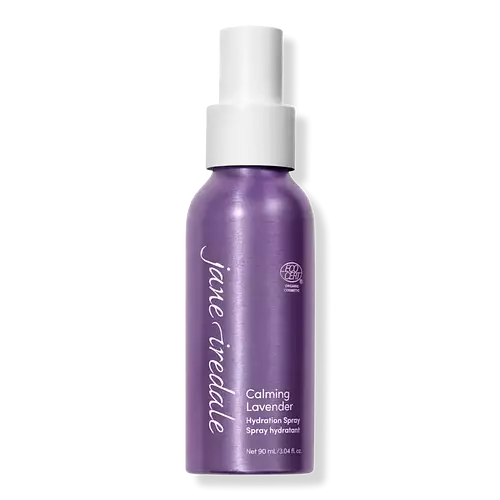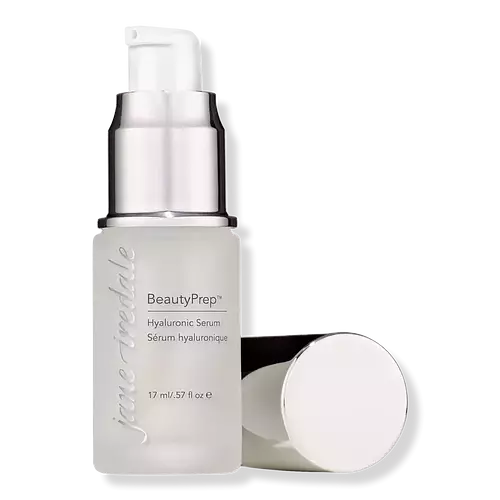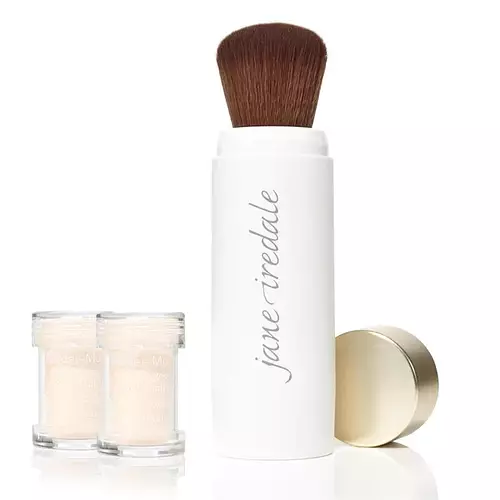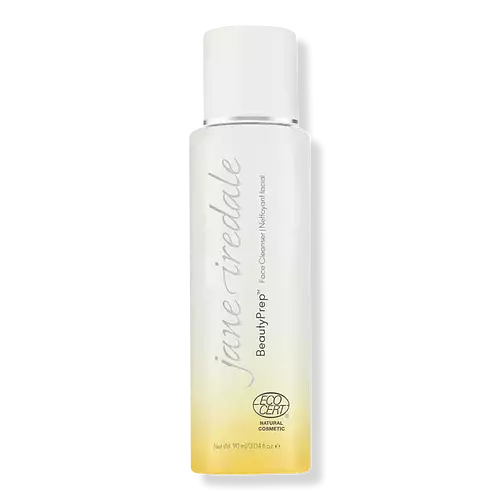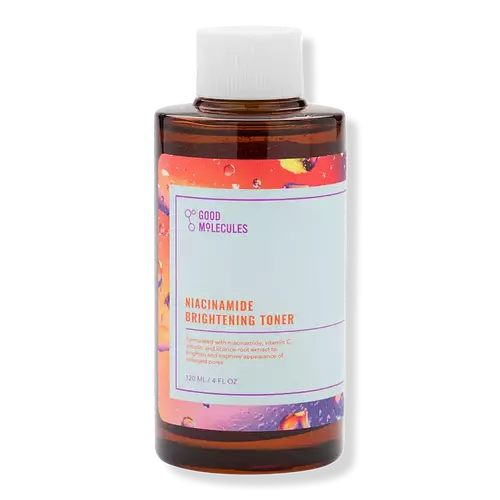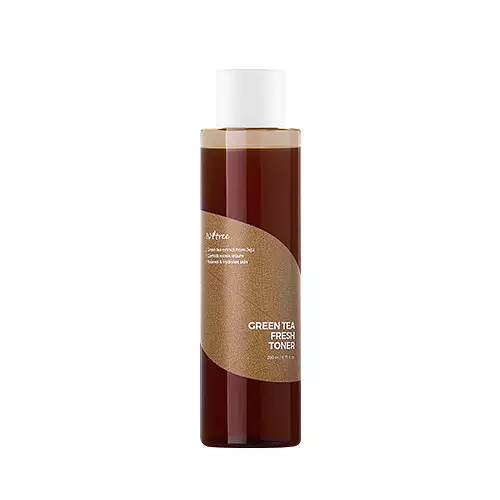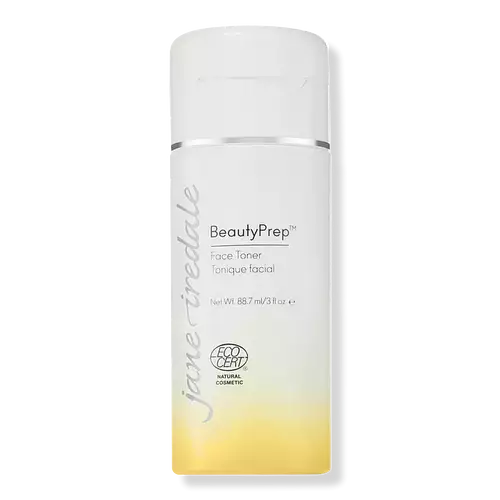
Jane Iredale BeautyPrep Face Toner Ingredients Explained
Published on July 17, 2023
Overview
What it is
Toner with 18 ingredients that contains Vitamin E
Cool Features
It is vegan, cruelty-free, and reef safe
Suited For
It has ingredients that are good for fighting acne, anti aging, dry skin, brightening skin, sensitive skin, reducing pores and scar healing
Free From
It doesn't contain any parabens, silicones or sulfates
Fun facts
Jane Iredale is from United States. This product is used in 2 routines created by our community.
We independently verify ingredients and our claims are backed by peer-reviewed research. Does this product need an update? Let us know.
Toner with 18 ingredients that contains Vitamin E
Quick info
You should know
Notable Ingredients
This product contains 1 ingredient that may have this attribute:
Benefits
This product contains 3 ingredients that may have this attribute:
This product contains 3 ingredients that may have this attribute:
This product contains 3 ingredients that may have this attribute:
This product contains 1 ingredient that may have this attribute:
This product contains 2 ingredients that may have this attribute:
This product contains 2 ingredients that may have this attribute:
This product contains 1 ingredient that may have this attribute:
This product contains 2 ingredients that may have this attribute:
Concerns
This product contains 1 ingredient that may have this attribute:
This product contains 1 ingredient that may have this attribute:
This product contains 1 ingredient that may have this attribute:
This product contains 1 ingredient that may have this attribute:
Ingredients 18
Water. It's the most common cosmetic ingredient of all. You'll usually see it at the top of ingredient lists, meaning that it makes up the largest part of the product.
Leuconostoc/Radish Root Ferment Filtrate is a natural preservative. It comes from fermenting radish roots with a bacteria called leuconostoc. Leuconostoc comes from lactic acid. This bacteria is used to make the traditional Korean side-dish, kimchi. It is also used to make sourdough bread (both incredibly yummy foods).
Daucus Carota Sativa Root Water is created by distilling parts of the carrot (the orange one we eat!).
Coconut water is the liquid found inside coconuts with hydrating, anti-inflammatory, and antioxidant properties.
Glycerin is already naturally found in your skin. It helps moisturize and protect your skin.
Rosa Canina Fruit Extract is from Rosehip. Rosehips are a fruit from a wild rose bush native to Eurasia and Africa.
Camellia Sinensis Leaf Extract is derived from the leaves of the tea plant. Black tea, green tea, and oolong tea are all harvested from this plant.
Calendula Officinalis Flower Extract comes from the common Marigold plant. Marigolds contain flavonoids. Flavonoids are a group of substances found naturally in plants. They possess antioxidant and inflammation properties.
Chamomilla Recutita Flower Extract comes from the Chamomile flower.
Citrus Aurantium Dulcis Oil comes from the bitter orange, an orange native to Southeast Asia.
Helianthus Annuus Seed Oil is the oil derived from the seeds of a Sunflower. Sunflower seed oil is non-fragrant. It is an emollient, meaning it helps to soften the skin.
Lecithin is a term for a group of substances found in plants, animals, and humans. They are made up of mixture of fatty acids. These fatty acids usually are a mixture of phosphoric acid's choline ester connected to stearic, oleic, and palmitic acids. Most lecithins are created from plant ingredients scuh as sunflower.
Tocopherol (also known as Vitamin E) is a common antioxidant used to help protect the skin from free-radicals and strengthen the skin barrier. It's also fat soluble - this means our skin is great at absorbing it.
Lavandula Angustifolia Oil is more commonly known as lavender essential oil. Lavandula Angustifolia is known as the English Lavender and famous for creating purple fields in Provence, France.
Alcohol comes in many different forms. Different types of alcohol will have different effects on skin. This ingredient is usually an astringent alcohol.
Water, Leuconostoc/Radish Root Ferment Filtrate, Pyrus Malus Fruit Water, Pyrus Communis Water, Daucus Carota Sativa Root Water, Cocos Nucifera Water, Glycerin, Rosa Canina Fruit Extract, Camellia Sinensis Leaf Extract, Calendula Officinalis Flower Extract, Chamomilla Recutita Flower Extract, Cymbopogon Flexuosus Oil, Citrus Aurantium Dulcis Oil, Helianthus Annuus Seed Oil, Lecithin, Tocopherol, Lavandula Angustifolia Oil, Alcohol
Ingredient Ratings
Based on the number of likes and dislikes each ingredient has received.
Ingredients Explained
Water. It's the most common cosmetic ingredient of all. You'll usually see it at the top of ingredient lists, meaning that it makes up the largest part of the product.
So why is it so popular? Water most often acts as a solvent - this means that it helps dissolve other ingredients into the formulation.
You'll also recognize water as that liquid we all need to stay alive. Talk about multi-purpose! If you see this, drink a glass of water. Stay hydrated!
Learn more about WaterLeuconostoc/Radish Root Ferment Filtrate is a natural preservative. It comes from fermenting radish roots with a bacteria called leuconostoc. Leuconostoc comes from lactic acid. This bacteria is used to make the traditional Korean side-dish, kimchi. It is also used to make sourdough bread (both incredibly yummy foods).
Leuconostoc/Radish Root Ferment Filtrate has antimicrobial properties and helps prevent the growth of bacteria in a product.
It is believed the preservation property comes from salicylic acid and ammonium salt, neither of which are involved in the fermentation process.
Learn more about Leuconostoc/Radish Root Ferment FiltratePyrus Malus Fruit Water is created by distilling parts of the apple.
Apples contain a large amount of antioxidants. Antioxidants help fight free-radicals. Free-radicals are molecules that may damage your skin cells.
The sugar in Apples helps keep the skin hydrated. Apples also contain some acids, such as malic acid. These acids may have a mild exfoliating effect.
Apples also contain Vitamins C and B.
Learn more about Pyrus Malus Fruit WaterWe don't have a description for Pyrus Communis Water.
Daucus Carota Sativa Root Water is created by distilling parts of the carrot (the orange one we eat!).
Carrots contain beta-carotene, a pigment responsible for giving plants the orange color. Beta-carotene is a potent antioxidant. Antioxidants may help reduce the signs of aging.
Glycerin is already naturally found in your skin. It helps moisturize and protect your skin.
A study from 2016 found glycerin to be more effective as a humectant than AHAs and hyaluronic acid.
As a humectant, it helps the skin stay hydrated by pulling moisture to your skin. The low molecular weight of glycerin allows it to pull moisture into the deeper layers of your skin.
Hydrated skin improves your skin barrier; Your skin barrier helps protect against irritants and bacteria.
Glycerin has also been found to have antimicrobial and antiviral properties. Due to these properties, glycerin is often used in wound and burn treatments.
In cosmetics, glycerin is usually derived from plants such as soybean or palm. However, it can also be sourced from animals, such as tallow or animal fat.
This ingredient is organic, colorless, odorless, and non-toxic.
Glycerin is the name for this ingredient in American English. British English uses Glycerol/Glycerine.
Learn more about GlycerinRosa Canina Fruit Extract is from Rosehip. Rosehips are a fruit from a wild rose bush native to Eurasia and Africa.
Rosehip contains Vitamin C, Vitamin E, fatty acids and linolenic acids. These nourish your skin barrier. Having hydrated skin helps reduce the appearance of fine-lines and wrinkles.
Vitamins C and E are potent antioxidants and may help with anti-aging. The fatty acids are emollients that help soften and hydrate your skin.
Another potent vitamin found in rosehip is Vitamin A, or retinol. Retinol encourages collagen production in the skin.
Rosehip extract may help with brightening the skin. Several components, such as beta-carotene, are able to reduce pigmentation caused by sun damage.
Learn more about Rosa Canina Fruit ExtractCamellia Sinensis Leaf Extract is derived from the leaves of the tea plant. Black tea, green tea, and oolong tea are all harvested from this plant.
Camellia Sinensis Leaf Extract has many benefits. It contains polyphenols, a strong antioxidant. Antioxidants help fight off free-radical molecules that damage skin cells. The antioxidants in green tea neutralize free-radicals from the sun. This gives the skin some extra UV protection, but should not replace sunscreen.
Many components of tea have anti-inflammatory properties. Polyphenols and L-theanine help soothe the skin and reduce irritation. L-theanine is an amino acid that makes up most of the amino acids found in tea leaves. The caffeine in Camellia Sinensis Leaf Extract helps calm inflamed blood vessels.
Camellia Sinensis Leaf Extract also contains Vitamin Bs, linoleic acid, magnesium, calcium, iron, and zinc.
Camellia Sinensis Leaf Extract also has antimicrobial properties.
Research has shown both drinking Camellia Sinensis Leaf Tea and applying it to the skin can help boost skin elasticity and hydration. Studies also show using tea extract may reduce sebum, or oil, production.
Learn more about Camellia Sinensis Leaf ExtractCalendula Officinalis Flower Extract comes from the common Marigold plant. Marigolds contain flavonoids. Flavonoids are a group of substances found naturally in plants. They possess antioxidant and inflammation properties.
Antioxidants help fight free-radical molecules. Free-radical molecules are capable of damaging our cells and other genetic material. Antioxidants help stabilize free-radicals by donating extra electrons. This may help reduce the signs of aging.
Calendula Officinalis Flower Extract may help soothe your skin by reducing inflammation. Emerging studies show it inhibits NO production safely, therefore reducing inflammation.
Marigolds have been used in traditional medicine throughout Asia and Europe.
Learn more about Calendula Officinalis Flower ExtractChamomilla Recutita Flower Extract comes from the Chamomile flower.
Chamomile is rich in antioxidants and has anti-inflammatory properties. Several compounds found in chamomile help with soothing, such as bisbolol.
Antioxidant components in chamomile make it an effective ingredient to help slow the signs of aging. Antioxidants help fight free-radical molecules, or molecules that may damage your skin.
Essential oils from chamomile have been found to improve wound healing due to its antimicrobial properties.
Ancient Greeks and Egyptians used Chamomile to treat skin redness and dryness. Chamomile has also been used to help treat stomach issues.
Learn more about Chamomilla Recutita Flower ExtractCymbopogon Flexuosus Oil is an oil.
Citrus Aurantium Dulcis Oil comes from the bitter orange, an orange native to Southeast Asia.
This orange is commonly used in cosmetics and food. It is a common ingredient for marmalade.
Citrus peels are often made up of mainly limonene, a fragrance with a citrus scent. They also contain flavonoids, which have anti-inflammatory properties.
Learn more about Citrus Aurantium Dulcis OilHelianthus Annuus Seed Oil is the oil derived from the seeds of a Sunflower. Sunflower seed oil is non-fragrant. It is an emollient, meaning it helps to soften the skin.
Sunflower seed oil contains many fatty acids. The fatty acids found in sunflower seeds include (from highest amount to least): linoleic acid, myristic acid, palmitic acid, stearic acid, arachidic acid, oleic acid, and linolenic acid.
These fatty acids help the skin create ceramides. Ceramides play a role in repairing the skin barrier.
Helianthus Annuus Seed Oil helps moisturize the skin. This in turn helps the skin look more rejuvenated and smoother.
Sunflowers are rich in vitamin E.
Historians believe Indigenous cultures of North America domesticated sunflowers before corn. Thus they relied on sunflower oil for a variety of uses. One such use is moisturizing skin and hair.
Sunflower seed oil may not be fungal acne safe. We recommend speaking with a professional if you have any concerns.
Learn more about Helianthus Annuus Seed OilLecithin is a term for a group of substances found in plants, animals, and humans. They are made up of mixture of fatty acids. These fatty acids usually are a mixture of phosphoric acid's choline ester connected to stearic, oleic, and palmitic acids. Most lecithins are created from plant ingredients scuh as sunflower.
Lecithin is an emollient. Emollients help soften the skin and creates a barrier to keep moisture in.
As an emulsifier, it also helps prevent water and oil ingredients from separating. Lecithin can help ingredients be better absorbed by the skin. The phospholipids in Lecithin can produce liposomes. Liposomes help other ingredients get through the skin barrier.
Learn more about LecithinTocopherol (also known as Vitamin E) is a common antioxidant used to help protect the skin from free-radicals and strengthen the skin barrier. It's also fat soluble - this means our skin is great at absorbing it.
Vitamin E also helps keep your natural skin lipids healthy. Your lipid skin barrier naturally consists of lipids, ceramides, and fatty acids. Vitamin E offers extra protection for your skin’s lipid barrier, keeping your skin healthy and nourished.
Another benefit is a bit of UV protection. Vitamin E helps reduce the damage caused by UVB rays. (It should not replace your sunscreen). Combining it with Vitamin C can decrease sunburned cells and hyperpigmentation after UV exposure.
You might have noticed Vitamin E + C often paired together. This is because it is great at stabilizing Vitamin C. Using the two together helps increase the effectiveness of both ingredients.
There are often claims that Vitamin E can reduce/prevent scarring, but these claims haven't been confirmed by scientific research.
Learn more about TocopherolLavandula Angustifolia Oil is more commonly known as lavender essential oil. Lavandula Angustifolia is known as the English Lavender and famous for creating purple fields in Provence, France.
Lavender imparts a scent and may sensitize skin. It contains linalool, a known allergen.
While lavender essential oil is commonly used in aromatherapy to help alleviate symptoms of anxiety and stress, more research is needed to confirm this.
However, lavender essential oil has shown to have anti-inflammatory activity due to its prostanoids and histamine content.
Lavandula Angustifolia Oil is the volatile oil obtained from the flowers of the Lavender, Lavandula angustifolia, Labiatae. ISO 8902:2009
Learn more about Lavandula Angustifolia OilAlcohol comes in many different forms. Different types of alcohol will have different effects on skin. This ingredient is usually an astringent alcohol.
These alcohols are drying on the skin. They may strip away your skin's natural oils and even damage your skin barrier. Astringent alcohols may also irritate skin.
Other types of astringent alcohols include:
According to the National Rosacea Society based in the US, you should be mindful of products with these alcohols in the top half of ingredients.
Any type of sanitizing product will have high amounts of alcohol to help kill bacteria and viruses.
Fatty alcohols come from plant oils such as coconut oil. These can help hydrate the skin and are non-irritating. Some fatty alcohols include cetyl and stearyl alcohol.
Learn more about AlcoholWhen to use
How this product is used by our community
Directions
Gently apply with a cotton pad to the entire face and leave on as a base for moisturizer.
Gently apply with a cotton pad to the entire face and leave on as a base for moisturizer.
More Jane Iredale Products
See all Jane Iredale productsMore Toners
See all tonersWe're dedicated to providing you with the most up-to-date and science-backed ingredient info out there.
The data we've presented on this page has been verified by a member of the SkinSort Team.
Read more about us

